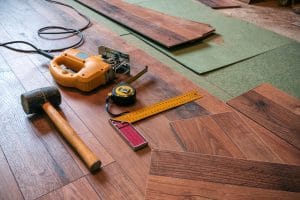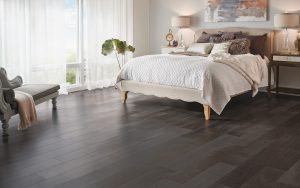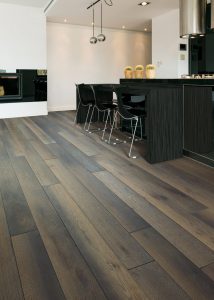Looking for an upgrade for your floors? Many people want the convenience and affordability of manufactured flooring. For years, there was one option for people who wanted an upscale manufactured flooring option: laminate. However, luxury vinyl planks have quickly become another popular flooring option. This guide will help you understand the similarities and differences between laminate and vinyl flooring.
In terms of appearance, because laminate planks are thicker, many people believe they have a more realistic-looking appearance than vinyl and can duplicate the appearance of natural stone, ceramic, and wood. However, thicker solid core (luxury) vinyl flooring can be embossed deeply, giving it a similar natural appearance.
Both laminate and vinyl flooring are low-maintenance in terms of care and cleaning. Laminate floors are supposed to be dry cleaned, with a broom or a dry mop, with damp mops and mild cleaners for more difficult dirt or debris. Vinyl floors can be wet-mopped and can withstand many cleaning products. However, while both products are considered durable and can withstand high traffic and heavy usage, if the top layers of the flooring are damaged, they cannot be repaired in the same way as a wood floor.
Vinyl can be installed in several different ways, from glued-down sheet vinyl to peel-and-stick vinyl tiles and even tongue-in-groove click and lock tiles. Laminate flooring is installed with the tongue-in-groove method, where they fit and lock together. Both laminate and vinyl plank flooring can be cut with ordinary saws and handled as a DIY project, but bigger installations with challenging cuts may be better handled by professionals.
In terms of price, both laminate and vinyl start around $1.00 per square foot, with the least expensive peel-and-stick vinyl tiles coming in at an even lower price point. However, for higher-quality laminate and luxury vinyl tile planks prices rise, with median-quality floors in the $5/ square foot (uninstalled) price range, while prices for premium luxury vinyl tile brands can easily double or even triple that price point.
The big difference between the two types of flooring is that vinyl flooring is completely made of synthetic materials, while laminate flooring has a wood byproduct core. This makes a significant difference in how water-resistant the materials are going to be. It also makes a difference in the thickness of the individual planks; laminate planks are substantially thicker than vinyl planks. Whether flooring materials are waterproof makes a difference in where they can be installed. If an area may be exposed to potential water or flooding, like a kitchen, bathroom, mudroom or laundry room, then waterproof luxury vinyl plank is probably a better choice.



